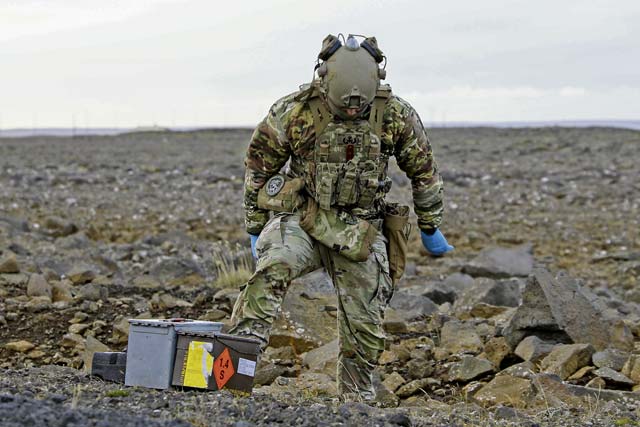
Explosive ordnance disposal teams from 14 nations met in Keflavik, Iceland to participate in Northern Challenge 22, Sept. 25 to Oct. 7. The 21st Theater Sustainment Command was one of the 30 participating teams enduring the challenging tasks and Arctic settings while engaging and sharing techniques, tactics and procedures with Allies.
Northern Challenge is an EOD exercise hosted by the Icelandic Coast Guard to train NATO Allies on current improvised explosive device threats and maintain proficiency by sharing experiences and knowledge to prepare teams to defeat devices on international missions on land and in maritime environments.
Iceland, a member of NATO since 1949, provides generous support for participants and is the ideal location for the EOD exercise. The Nordic country fosters a challenging climate, offers accessible diving locations and the ability to have live explosives. The latter is a critical factor for these types of exercises.
In addition to the U.S., participating nations were Austria, Belgium, Canada, Denmark, France, Germany, Iceland, Lithuania, the Netherlands, New Zealand, Norway, Poland and the United Kingdom. The exercise cultivated many opportunities to practice interoperability, with over 400 participants and 375 land and maritime tasks. Throughout the two-week exercise tasks grew more difficult and harsh weather conditions persisted.
Land and maritime teams were briefed each morning about how to defeat the device with background information such as adversary TTPs and were provided an international directing staff and exercise control teams. DECT set up the task, provided feedback on the team’s solution and reported how the team operated, leading to the understanding of how nations can operate alongside one another.
U.S. Army Staff Sgt, Patrick Doherty, EOD team leader, 702nd Explosive Ordnance Disposal Company, 15th Engineer Battalion, 18th Military Police Brigade, 21st TSC, was proud of his team’s performance. This was Doherty’s first EOD exercise, and he liked the multi-national involvement, levels of experience and feedback.
“We will never know everything,” said Doherty. Working with different countries was the highlight of Doherty’s experience and he appreciated their input after tasks.
“It is always good to ask more questions than you think you will need because, then, it could give you more insight into the devices or the problems,” said Doherty.
This year was the 21st Northern Challenge exercise and a new intelligence aspect was introduced into the EOD scope. The intelligence section received reports from operators, DECTs, forensics, and engineers to analyze, assess and inform the commander on how to defeat the device.
“We have a complete intelligence cycle going on in this exercise,” said Denmark Army Master Sgt. Rikke Rietveld, lead of the intelligence cell for Northern Challenge 22 and head of the EOD section at NATO Multinational Corps Northeast in Poland.
“It is very important for us to train our EOD operators to the newest trends and the newest threats that they might encounter,” said Rietveld.
Operators were taught the importance of preserving forensics and the process of gathering evidence safely and quickly. According to Rietveld, forensic awareness is an important task and function to teach operators. The evidence gathered is potentially used for court or prosecution and to build a network.
Rietveld said learning from one another was the purpose of the joint exercise. Understanding how teams operate builds interoperability by learning how nations can operate together.
Iceland’s central presence allows NATO Allies the opportunity to strengthen relationships and share experiences to contribute to future missions.


